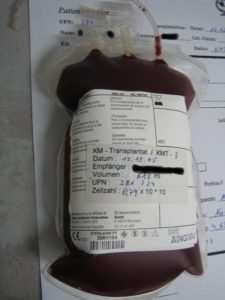
Recently Diagnosed or Relapsed? Stop Looking For a Miracle Cure, and Use Evidence-Based Therapies To Enhance Your Treatment and Prolong Your Remission
Multiple Myeloma an incurable disease, but I have spent the last 25 years in remission using a blend of conventional oncology and evidence-based nutrition, supplementation, and lifestyle therapies from peer-reviewed studies that your oncologist probably hasn't told you about.
Click the orange button to the right to learn more about what you can start doing today.
- You are here:
- Home »
- Blog »
- Multiple Myeloma »
- Myeloma – Onc. Pushing Stem Cell Transplant
Myeloma – Onc. Pushing Stem Cell Transplant
While these categories indicate that a patient has responded exceedingly well to treatment, they don’t imply that all cancer cells have been eradicated from the body
Hi David. I’m curious if you still think not doing an SCT is the best way to go? I believe the current statistics are showing longer overall survival outcomes with SCT (autologous stem cell transplant) as opposed to without them.
I’ve just relapsed and have started RVD (revlimid, velcade, dexamethasone) recently and my onc is strongly pushing me towards a transplant although I’d definitely prefer not do one. It’s a decision I’ll have to make soon.
I did 3 rounds of RVD 5 years ago and refused SCT. I’ve been off all meds for last 4 years till I started back on RVD 3 weeks ago. My light chains shot up to 800 recently and I had a very bad lesion in my lower back. I’ve no other markers. No side effects from the drugs other than a rash that seems to have cleared. Sam
Hi Sam- I believe that the decision to undergo ASCT or not, sooner or later, depends on multiple factors. Numerous studies have been done for ASCT in MM and the findings have always been mixed. My overall view is that each and every MM patient/survivor must make the decision for him/herself based on his/her issues at the time.
A five year remission after only 3 rounds of RVd is an excellent response. My guess is that you reached either MRD- or CR after only 3 rounds of chemo.
I think it is highly likely that your MM would not respond to additional RVd if you had undergone more than 3 rounds of this triplet originally.
My thinking is that because you respond so well to relatively low-doses of chemotherapy, you may want to continue with this approach. Meaning, high dose chemotherapy, which is what an ASCT is, is extremely toxic and may cause short, long-term and late stage side effects. And you probably would not achieve a longer OS aka overall survival.
I am pushing on the idea of toxicity so much because the issue faced by all MM survivors is multi-drug resistance (MDR). This means that all chemotherapy regimens eventually STOP working. You are doing well by managing your MM thus far with very little chemo, very little toxicity.
It is up to you of course, but if you have harvested your own stem cells, you can always have an ASCT. As you oncologist if there is any harm in trying to reach another remission with more RVd? I see lots of upside but little downside?
To Learn More about ASCT and Harvesting Stem Cells- click now
Thank you,
David Emerson
- MM Survivor
- MM Coach
- Director PeopleBeatingCancer
Recommended Reading:
- Multiple Myeloma Therapy- MRD- Bisphosphonate vs. Supplements
- “Oh no, I’m MRD-positive!,” What do MM patients do if they are Positive not Negative?
- MRD After MM Induction- Don’t Need ASCT?
What is Minimal Residual Disease Negativity for Multiple Myeloma?
“Minimal residual disease negativity – or MRD negativity – is a highly sensitive measure of the effectiveness of therapy for multiple myeloma, a cancer of plasma cells of the bone marrow…
Since 2006, when physicians adopted uniform international standards for monitoring patients with multiple myeloma and gauging their response to treatment, the deepest, most extensive responses have been characterized as “complete” or, at a more fine-grained level, “stringent complete.”
Patients with a complete response have no evidence of myeloma proteins in their blood or urine as measured by standard laboratory techniques. Those with a stringent complete response lack certain signs of myeloma by even stricter criteria.
While these categories indicate that a patient has responded exceedingly well to treatment, they don’t imply that all cancer cells have been eradicated from the body – patients may still have low levels of myeloma known as minimal residual disease.
Drug resistance in multiple myeloma.
“However, most patients eventually relapse and often demonstrate multiple drug resistance. Therefore there is still an urgent and unmet need to define the molecular mechanisms of resistance for available drugs in order to enhance the use of existing treatments and design more effective therapies.
Genetic abnormalities are well known to play a central role in MM resistance to available drugs, and epigenetic aberrations mainly affecting the patterns of DNA methylation and histone modifications of genes, especially tumor suppressors, can be involved in the resistance mechanism.
Moreover, defects in the mechanisms of apoptosis, senescence and DNA repair could also contribute to drug resistance. In addition, mutations or alterations in the expression of the drug target can influence response to therapy. Achieving a better understanding of the pathways and protein expression involved in MM drug resistance and the development of novel therapeutic strategies are important goals for further progress in the treatment of MM. This review gives a critical overview of the role of cellular, microenvironmental and molecular mechanisms of drug resistance in MM.”


